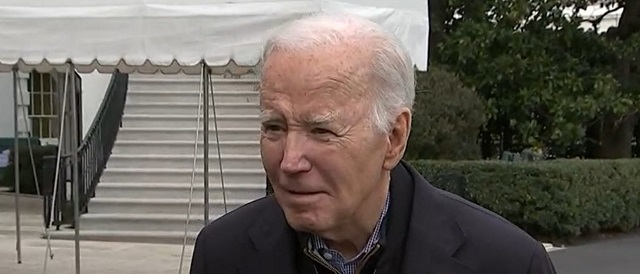Great Reset
Government Admission: Biden Parole Flights Create Security ‘Vulnerabilities’ at U.S. Airports Government Admission: Biden Parole Flights Create Security ‘Vulnerabilities’ at U.S. Airports

From the Center for Immigration Studies
DHS still refusing to say which airports are receiving inadmissible aliens from abroad
But while large immigrant-receiving cities and media lay blame for the influx on Texas Republican Gov. Greg Abbott’s busing program, CBP has withheld from the Center – and apparently will not disclose – the names of the 43 U.S. airports that have received 320,000 inadmissible aliens from January through December 2023, nor the foreign airports from which they departed. The agency’s lawyers have cited a general “law enforcement exception” without elaborating – until recently – on how releasing airport locations would harm public safety beyond citing “the sensitivity of the information.”
Now, though, CIS’s litigation has yielded a novel and newsworthy answer from the government: The public can’t know the receiving airports because those hundreds of thousands of CBP-authorized arrivals have created such “operational vulnerabilities” at airports that “bad actors” could undermine law enforcement efforts to “secure the United States border” if they knew the volume of CBP One traffic processed at each port of entry.
In short, the Biden administration’s legally dubious program to fly inadmissible aliens over the border and directly to U.S. airports has allegedly created law enforcement vulnerabilities too grave to release publicly, lest “bad actors” take advantage of them to inflict harm on public safety. Or, more specifically, here’s how CBP’s lawyers, in email communications with CIS and summarized in a CIS Joint Status Filing, characterized FOIA’s law enforcement exception (b)(7)(E) in explaining their refusal to release just the domestic U.S. airport locations:
Exception (b)(7)(E) has been applied to the identifying information for air ports of entry, which, if disclosed would reveal information about the relative number of individuals arriving, and thus resources expended at particular airports which would, either standing alone or combined with other information, reveal operational vulnerabilities that could be exploited by bad actors altering their patterns of conduct, adopting new methods of operation, and taking other countermeasures, thereby undermining CBP’s law enforcement efforts to secure the United States borders.
The agency’s attorneys floated a similar argument for withholding the locations of foreign departure airports, adding only that “bad actors” abroad who found out about the “resources expended toward travelers arriving from particular airports” could “extrapolate” from the numbers leaving foreign airports to identify the receiving U.S. airports and then undermine law enforcement’s ability to secure the border (which includes international airports).
The program at the center of the FOIA litigation is perhaps the most enigmatic and least-known of the Biden administration’s uses of the CBP One cell phone scheduling app, even though it is responsible for almost invisibly importing by air 320,000 aliens with no legal right to enter the United States since it got underway in late 2022. It remains part of the administration’s “lawful pathways” strategy, with its stated purpose being to reduce the number of illegal border entries between ports of entry. The countries whose citizens are eligible are Cuba, Haiti, Venezuela, Nicaragua, El Salvador, Guatemala, Honduras, Colombia, and Ecuador.
Under these legally dubious parole programs, aliens who cannot legally enter the country use the CBP One app to apply for travel authorization and temporary humanitarian release from those airports. The parole program allows for two-year periods of legal status during which adults are eligible for work authorization.
The government characterizes these programs as “family reunification programs”.
While seven of the nationalities, excluding Venezuelans and Nicaraguans, can claim eligibility under older family reunification parole programs, all can also just fly in if they can show they have a non-family financial sponsor (which can even be “an organization, business, or other entity”) and meet other requirements, such as owning a valid passport and passing security checks based on biometric information provided through CBP One.
Upon receiving authorization from Washington, they buy air passage to U.S. international airports where CBP personnel process them for release in short order. All are said to be responsible for paying for their own airfare.
They and inadmissible aliens from many dozens of other countries also get this parole benefit at eight U.S.-Mexico land ports of entry. That separate parole program has brought in another 420,000 immigrants from nearly 100 nations from May 2021 through December 2023, according to CIS lawsuit data updated through December 2023. (See links to the 2023 report below, which reflects data through August)
For most of the past year, big-city mayors and state governors have loudly complained about the hundreds of thousands of foreigners showing up in need of housing, food, medical treatment, clothing, and education, placing extraordinary unfunded financial burdens on local populations. Routinely, politicians and major media outlets have laid blame for the influx on Texas Gov. Greg Abbott’s busing program.
But the airport location information would undoubtedly provide a more accurate and complete picture of what is happening, though the administration would not be able to blame the Texas governor for these arrivals.
The redacted records received by CIS show a clear preference for some airports over others, with a dozen unnamed facilities receiving most of the 320,000.
Release by the government of the airport data would serve an important public interest in that it would provide voters and public officials with information to pressure the Biden government to reduce monthly arrival rates into their cities and states.
Colin M. Farnsworth, CIS’s Chief FOIA Counsel, said the Center rejects the government’s explanation about bad actors exploiting “operational vulnerabilities” at airports on grounds that CBP pre-screens and pre-schedules the arrival of CBP One applicants at each port of entry. He said CIS will litigate for a total release of the airport information.
Bad actors already have access to airport travel volumes, through CBP’s own “Traveler and Conveyance Statistics website.” Its statistics for cities whose travails with migrant arrivals are well-publicized show striking airport arrival increases from FY 2022, before the airlift program, through 2023.
Boston airports, for instance, spiked from 2.3 million during FY 2022 to 3.3 million in 2023, the public CBP website shows. Chicago, another migrant hotspot, rose from 6.3 million airport travelers in FY2022 to 7.9 million in 2023. New York City airports spiked from 17.7 million airport arrivals in 2022 to 22.9 million in 2023.
Related reports from Center for Immigration Studies FOIA litigation are based on data provided through August 2023 and the early part of September 2023. CBP has since provided data for all of September, October, November, and December 2023, which are reflected above in this report.
The following are the prior reports reflecting the earlier data:
- New Records: Biden DHS Has Approved Hundreds of Thousands of Migrants for Secretive Foreign Flights Directly into U.S. Airports
- New Records Unveil Surprising Scope of Secretive ‘CBP One’ Entry Scheme
- Thousands of ‘Special Interest Aliens’ Posing Potential National Security Risks Entering via CBP One App
- Powerful Senator Demands DHS Answer Questions About ‘Special Interest Alien” Approved Entries in CBP One app.
- Why is Biden Quietly Granting ‘Humanitarian Protection’ to Thousands of Mexicans?
Business
ESG Puppeteers

From Heartland Daily News
By Paul Mueller
The Environmental, Social, and Governance (ESG) framework allows a small group of corporate executives, financiers, government officials, and other elites, the ESG “puppeteers,” to force everyone to serve their interests. The policies they want to impose on society — renewable energy mandates, DEI programs, restricting emissions, or costly regulatory and compliance disclosures — increase everyone’s cost of living. But the puppeteers do not worry about that since they stand to gain financially from the “climate transition.”
Consider Mark Carney. After a successful career on Wall Street, he was a governor at two different central banks. Now he serves as the UN Special Envoy on Climate Action and Finance for the United Nations, which means it is his job to persuade, cajole, or bully large financial institutions to sign onto the net-zero agenda.
But Carney also has a position at one of the biggest investment firms pushing the energy transition agenda: Brookfield Asset Management. He has little reason to be concerned about the unintended consequences of his climate agenda, such as higher energy and food prices. Nor will he feel the burden his agenda imposes on hundreds of millions of people around the world.
And he is certainly not the only one. Al Gore, John Kerry, Klaus Schwab, Larry Fink, and thousands of other leaders on ESG and climate activism will weather higher prices just fine. There would be little to object to if these folks merely invested their own resources, and the resources of voluntary investors, in their climate agenda projects. But instead, they use other people’s resources, usually without their knowledge or consent, to advance their personal goals.
Even worse, they regularly use government coercion to push their agenda, which — incidentally? — redounds to their economic benefit. Brookfield Asset Management, where Mark Carney runs his own $5 billion climate fund, invests in renewable energy and climate transition projects, the demand for which is largely driven by government mandates.
For example, the National Conference of State Legislatures has long advocated “Renewable Portfolio Standards” that require state utilities to generate a certain percentage of electricity from renewable sources. The Clean Energy States Alliance tracks which states have committed to moving to 100 percent renewable energy, currently 23 states, the District of Columbia, and Puerto Rico. And then there are thousands of “State Incentives for Renewables and Efficiency.”
Behemoth hedge fund and asset manager BlackRock announced that it is acquiring a large infrastructure company, as a chance to participate in climate transition and benefit its clients financially. BlackRock leadership expects government-fueled demand for their projects, and billions of taxpayer dollars to fund the infrastructure necessary for the “climate transition.”
CEO Larry Fink has admitted, “We believe the expansion of both physical and digital infrastructure will continue to accelerate, as governments prioritize self-sufficiency and security through increased domestic industrial capacity, energy independence, and onshoring or near-shoring of critical sectors. Policymakers are only just beginning to implement once-in-a-generation financial incentives for new infrastructure technologies and projects.” [Emphasis added.]
Carney, Fink, and other climate financiers are not capitalists. They are corporatists who think the government should direct private industry. They want to work with government officials to benefit themselves and hamstring their competition. Capitalists engage in private voluntary association and exchange. They compete with other capitalists in the marketplace for consumer dollars. Success or failure falls squarely on their shoulders and the shoulders of their investors. They are subject to the desires of consumers and are rewarded for making their customers’ lives better.
Corporatists, on the other hand, are like puppeteers. Their donations influence government officials, and, in return, their funding comes out of coerced tax dollars, not voluntary exchange. Their success arises not from improving customers’ lives, but from manipulating the system. They put on a show of creating value rather than really creating value for people. In corporatism, the “public” goals of corporations matter more than the wellbeing of citizens.
But the corporatist ESG advocates are facing serious backlash too. The Texas Permanent School Fund withdrew $8.5 billion from Blackrock last week. They join almost a dozen state pensions that have withdrawn money from Blackrock management over the past few years. And last week Alabama passed legislation defunding public DEI programs. They follow in the footsteps of Florida, Texas, North Carolina, Utah, Tennessee, and others.
State attorneys general have been applying significant pressure on companies that signed on to the “net zero” pledges championed by Carney, Fink, and other ESG advocates. JPMorgan and State Street both withdrew from Climate Action 100+ in February. Major insurance companies started withdrawing from the Net-Zero Insurance Alliance in 2023.
Still, most Americans either don’t know much about ESG and its potential negative consequences on their lives or, worse, actually favour letting ESG distort the market. This must change. It’s time the ESG puppeteers found out that the “puppets” have ideas, goals, and plans of their own. Investors, taxpayers, and voters should not be manipulated and used to climate activists’ ends.
They must keep pulling back on the strings or, better yet, cut them altogether.
Paul Mueller is a Senior Research Fellow at the American Institute for Economic Research. He received his PhD in economics from George Mason University. Previously, Dr. Mueller taught at The King’s College in New York City.
Originally posted at the American Institute for Economic Research, reposted with permission.
Censorship Industrial Complex
Jim Jordan Exposes Biden’s Censorship-Industrial Complex

 From the Daily Caller News Foundation
From the Daily Caller News Foundation
By TOM HEBERT
“Internal talking points prepared by Amazon,” says the report, “included the question: ‘Is the [Biden] Admin asking us to remove books, or are they more concerned about search results/order (or both).’”
High-ranking Biden White House operatives coerced Big Tech companies into censoring posts critical of the Biden administration or those that spread so-called “misinformation” about COVID-19. A blockbuster new report from the House Judiciary Committee, which is chaired by Rep. Jim Jordan, exposes how the Biden administration weaponized Big Tech against conservatives.
“The report,” the committee said when it released it, “details the months-long campaign by the Biden White House to coerce large companies, namely Facebook, Google, and Amazon, to censor books, videos, posts, and other content online. By the end of 2021, Facebook, YouTube, and Amazon changed their content moderation policies in ways that were directly responsive to criticism from the Biden Administration.”
This report is the result of a multi-year investigation by the Judiciary Committee’s Select Subcommittee on the Weaponization of the Federal Government. The evidence, including tens of thousands of emails and other non-public documents, shows a disturbing pattern of Biden officials pressuring Big Tech companies into censoring Americans online.
Shortly after Biden’s inauguration in 2021, then-White House Digital Director Rob Flaherty began haranguing top Facebook officials for more detail on their policies for taking down COVID-19 related posts. “In February 2021,” says the report, “Facebook increased its censorship of anti-vaccine content as well as the lab leak theory of the origin of the virus because of ‘tense conversations with the new [Biden] Administration’ and as part of an effort to be responsive to the Biden White House’s exhortations to ‘do more’ to combat alleged misinformation.”
As 2021 progressed, the White House demanded to know what Facebook was doing to censor “borderline content,” posts that did not violate Facebook’s content moderation policies but were nevertheless objectionable to Biden officials. “Facebook would meet again with the Biden White House on March 12, 2021, to discuss how it was approaching ‘borderline content,’ that is, content that did not violate its policies,” says the report.
“Facebook walked through its policies and enforcement practices for violative and borderline content,” it says. “But call notes reveal that throughout the meeting, Flaherty continued to ask about the removal and reduction of content above all else.”
Unsatisfied with Facebook’s unwillingness to “play ball,” Flaherty and the White House played hard ball. On July 16, 2021, a reporter asked Biden: “On Covid misinformation, what’s your message to platforms like Facebook?” Biden responded: “They’re killing people.”
In response to the intense pressure from the White House, Facebook went on to change their content moderation policies and censored posts about vaccine hesitancy and the lab-leak theory.
Facebook was not the only social media platform that Biden officials pressured. In April 2021, Flaherty reached out to YouTube with a litany of questions about YouTube’s efforts to censor borderline content. “Flaherty’s email was particularly focused on how YouTube handled non-violative ‘borderline’ content,” says the report. “These requests were prefaced by stating the Biden White House wanted ‘to be sure that you have a handle on vaccine hesitancy generally and are working toward making the problem better’ and that this ‘is a concern that is shared at the highest (and I mean highest) level of the [White House].’”
After Flaherty succeeded in making YouTube change its content moderation policies “to remove content that questioned the safety or efficacy of COVID-19 vaccines,” other Biden bureaucrats started to pester YouTube employees to clamp down on other content. In March 2022, according to the committee report, former Biden advisor Tim Wu asked for a meeting with Google employees to discuss “Russian misinformation/disinformation” and “airline competition.”
Another staffer communicated with YouTube about abortion-related content. “On July 14, 2022, YouTube Government Affairs staff contacted White House personnel to brief them on ‘updates related to addressing reproductive health misinformation on YouTube,’ to which White House staff responded, saying that they were ‘specifically interested in abortion,’” said the report.
Biden officials clearly sought to censor content they perceived as politically damaging to Biden.
The report also shows the White House’s obsession suppressing books that they disagreed with. In March 2021, the Biden White House emailed an Amazon executive “asking to have a discussion regarding the ‘high levels of propaganda and misinformation and disinformation at Amazon.’”
“Internal talking points prepared by Amazon,” says the report, “included the question: ‘Is the [Biden] Admin asking us to remove books, or are they more concerned about search results/order (or both).’”
There are two important takeaways from this report.
One, the Biden administration sought to impose a censorship regime through Big Tech to benefit the president politically.
Two, Congress should act to prevent future government-directed censorship of American speech. There are numerous bills that would address this problem. The House passed the “Protecting Speech from Government Interference Act” last year, legislation that would ban bureaucrats from advocating for censorship of viewpoints. The “Free Speech Protection Act” imposes penalties on bureaucrats who censor speech, and the “Censorship Accountability Act” would allow Americans to sue bureaucrats who violate their First Amendment rights.
The Biden administration has displayed an appalling amount of contempt for American free speech. Exposing Biden’s censorship-industrial complex is an important first step toward ensuring that unelected bureaucrats do not have a veto over what we say online.
Tom Hebert is Director of Competition and Regulatory Policy at Americans for Tax Reform and executive director of the Open Competition Center.
-

 Automotive2 days ago
Automotive2 days agoGovernments in Canada accelerate EV ‘investments’ as automakers reverse course
-

 conflict1 day ago
conflict1 day agoWhite House Reportedly Worried About Russia’s Sudden Momentum Months After Biden Declared Putin ‘Already Lost’ War
-

 Health1 day ago
Health1 day agoSouth Korean president declares low birth rate a ‘national emergency,’ plans new ministry to address it
-

 Economy2 days ago
Economy2 days agoBiden signs suicidal ‘No Coal’ pact, while rest of world builds 1,000 new plants
-

 Crime1 day ago
Crime1 day agoSlovakian prime minister who opposed WHO Pandemic Treaty shot in assassination attempt
-

 Alberta1 day ago
Alberta1 day agoFortis et Liber: Alberta’s Future in the Canadian Federation
-

 Health1 day ago
Health1 day agoUK pediatrician who led review of child ‘transitions’ says US medical groups ‘misleading the public’
-

 COVID-1913 hours ago
COVID-1913 hours agoNIH Quietly Altered Definition For Gain-Of-Function Research On Its Website, Former Fauci Aide Confirms







